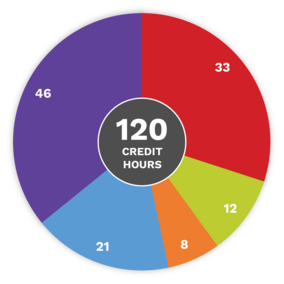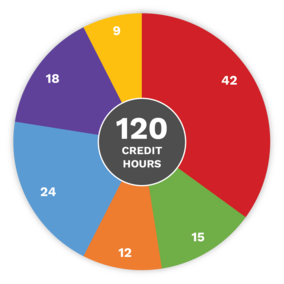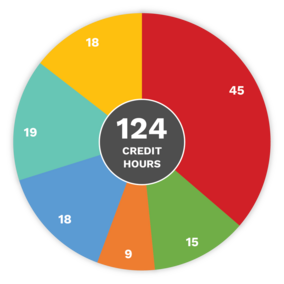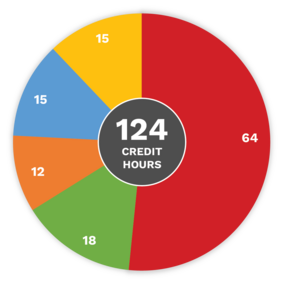The School of Computing offers four majors: data science, computer science, computer engineering, and software engineering.
Students can expect to take many of the same courses and learn valuable computing skills in each major, but courses and requirements will vary among the four.
Learn more about our four majors by reviewing each of the majors pages, the charts and information below, and additional details about courses and requirements in the Undergraduate Catalog.
Majors Overview
Major Overview
Data Science
The data science major prepares students with skills and competency in data analysis and interpretation, algorithm design and implementation, and problem solving. The interdisciplinary program enables students to take advantage of career opportunities across diverse fields involving data-rich, data-driven systems and applications.
Computer Science
The computer science major focuses on theoretical and practical disciplines that will prepare students for any computing career path. Students will learn both fundamentals and high-level concepts and will have the flexibility to explore a variety of specialized computing topics tailored to their specific goals, interests, and desired skills.
Computer Engineering
The computer engineering major focuses on the integration of hardware and software system design, and students will learn to combine computing concepts with technical hardware skills. This major prepares students with the range of expertise required to develop a holistic view of computer-based systems and to make global design decisions.
Software Engineering
The software engineering major focuses on the engineering principles and practices necessary to build, maintain, and protect complex modern systems. Students study within a small cohort of fellow majors and are well prepared for careers in the tech field thanks to this program’s unique, hands-on curriculum modeled after real industry work.
What You'll Learn
What You'll Learn
Data Science
Students will study various aspects of data science such as data collection, visualization, computational methodologies, and applications. In addition to choosing a focus area, they’ll also pursue either a minor or a second major in a discipline that both complements and enhances their data science studies.
Computer Science
Students will study advanced computing topics such as artificial intelligence, security, networking, cryptography, and high-end computing. Many choose to add a second major or a minor in another complementary subject such as business or math. They can also add another minor if they’ve completed the foreign language requirement.
Computer Engineering
Students will study topics such as digital logic and technologies, programming, system components and design, application of theory, experimentation, tools and techniques, and maintenance. Students will take many of the same courses as computer science majors, but will take electrical engineering courses instead of other subjects.
Software Engineering
Students will learn software engineering concepts such as design, architecture, development, analysis, testing, maintenance, and documentation starting in their first year. Students also spend not just one but two years collaborating on professional projects in our Senior Design capstone course.
Majors Requirements
Majors Requirements
| Data Science | Computer Science | Computer Engineering | Software Engineering |
| Total Credit Hours | 120 | 120 | 126 | 123 |
| Major Credit Hours | 33 | 36 | 42 | 63 |
| Foreign Language | 2 years high school | 2 years high school | 2 years high school | 2 years high school |
| Science | 8 hours including at least one laboratory | 12 hours including at least one laboratory | Physics and Chemistry | 12 hours including at least one laboratory |
| Mathematics | Calc I and II, or Business Calc and Contemporary Math | Calc I, II, Stats, Linear Algebra | Calc I, II, III, Diff. Eq., Linear Algebra | Calc I, II, Stats, Linear Algebra and one elective |
| Technical Electives | 12 (toward required focus area) | 9 | 15 | 15 |
| Open Electives | 0 | 11 | 3 | 0 |
| Capstone | One year | One year | One year | Two years |
| Internship | Optional | Optional | Optional | Required |
| Second Major | Optional | Optional | Not required | Not required |
| Minor | Not required | Required | Optional Minor | Optional Minor |
| Focus Area | Required | Optional | Optional | Optional |
Focus Areas
Focus Areas
Data Science
- Artificial Intelligence
- Software Development
- Data Pipeline
- Statistical Modeling
- Mathematical Modeling
- Applied Data Science: Sociology
- Applied Data Science: Natural Resources
- Applied Data Science: Journalism & Humanities
Computer Science
- Artificial Intelligence
- Computer Architecture & High-Performance Computing
- Cybersecurity
- Foundations of Computing
- IoT, Robotics, & Embedded Systems
- Networking
- Software Engineering
- User-Centered Computing
Computer Engineering
- Embedded Systems & Robotics
- VLSI Design
- Signal Processing & Communications
- High-Performance Computing
Software Engineering
- Artificial Intelligence
- Computer Architecture & High-Performance Computing
- Cybersecurity
- Foundations of Computing
- IoT, Robotics, & Embedded Systems
- Networking
- User-Centered Computing
Learn more about our focus areas here.
Credit Hours Per Major
Credit Hours Per Major

Data Science
| Course Areas | Credit Hours |
| Core | 33 |
| Focus Areas | 12 |
| Natural Sciences | 8 |
| General Studies | 21 |
| Open Electives | 46 |

Computer Science
| Course Areas | Credit Hours |
| Core | 42 |
| Mathematics | 15 |
| Natural Sciences | 12 |
| General Studies | 24 |
| Open Electives | 18 |
| Technical Electives | 9 |

Computer Engineering
| Course Areas | Credit Hours |
| Core | 45 |
| Mathematics | 15 |
| Natural Sciences | 9 |
| General Studies | 18 |
| Electrical Engineering | 19 |
| Technical Electives | 18 |

Software Engineering
| Course Areas | Credit Hours |
| Core | 64 |
| Mathematics | 18 |
| Natural Sciences | 12 |
| General Studies | 15 |
| Technical Electives | 15 |

